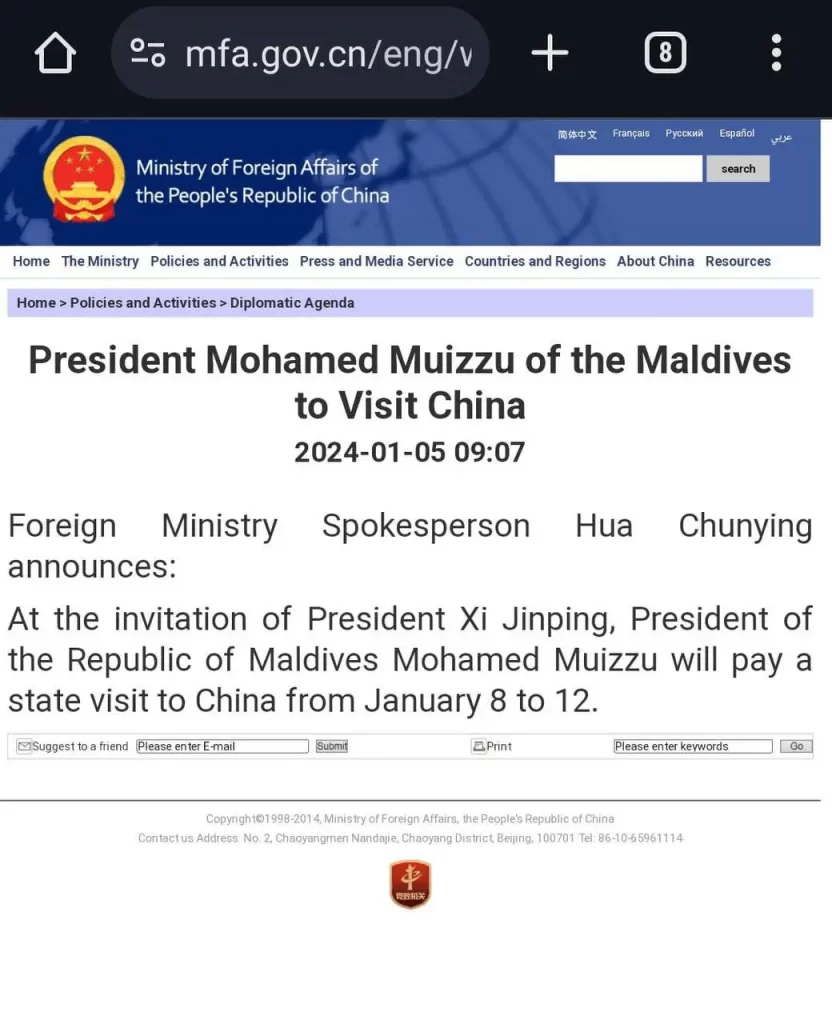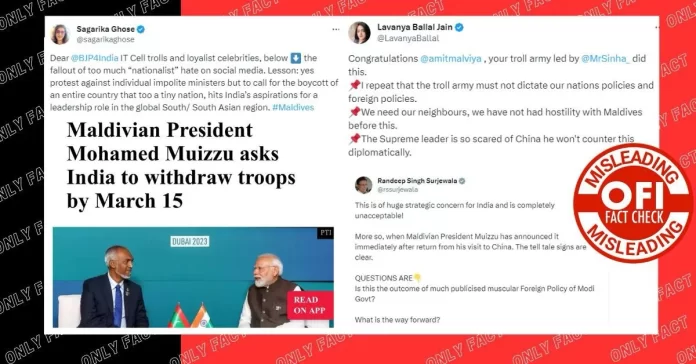The recent geopolitical dispute between India and the Maldives has commanded significant attention across the Indian subcontinent. This focal point was accentuated by the visit of Indian Prime Minister Narendra Modi to the Lakshadweep archipelago on January 5, where he shared visual insights of his visit. However, the harmony in diplomatic discourse took a downturn when certain ministers of the Maldivian government chose to cast aspersions on Indian and Hindu religious sentiments, provoking a swift and proactive response from Indian social media users. This exchange of verbal volleys subsequently strained the bilateral relations between the two nations. The Muizzu government of the Maldives encountered severe criticism from opposition leaders and the business community alike.
In the aftermath of the aforementioned controversy, Mohammad Muizzu embarked on a diplomatic visit to China, responding to an invitation extended by Beijing. Within the context of their bilateral discussions, the Maldives formalized a series of agreements with China, spanning diverse sectors such as trade and tourism. At times, when Mohammad Muizzu was steering his nation into the abyss of debt hole with the assistance of his Chinese friends, a starkly different narrative unfolded in India. Here, the opposition political bloc was engrossed in a vigorous critique directed at Indian Prime Minister Narendra Modi and the Minister of External Affairs, S. Jaishankar.
Prominent Congress Leader Randeep Singh Surjewala tweeted, ‘This is of huge strategic concern for India and is completely unacceptable!’
More so, when Maldivian President Muizzu has announced it immediately after return from his visit to China. The tell tale signs are clear.
QUESTIONS ARE👇
Is this the outcome of much publicised muscular Foreign Policy of Modi Govt? What is the way forward? How does it impact India’s maritime & security interests?’
This is of huge strategic concern for India and is completely unacceptable!
— Randeep Singh Surjewala (@rssurjewala) January 15, 2024
More so, when Maldivian President Muizzu has announced it immediately after return from his visit to China. The tell tale signs are clear.
QUESTIONS ARE👇
Is this the outcome of much publicised muscular… pic.twitter.com/DVfX7jD5zP
Congress Spokesperson Lavanya Ballal Jain wrote, ‘Congratulations amitmalviya , your troll army led by MrSinha_ did this. I repeat that the troll army must not dictate our nations policies and foreign policies. We need our neighbours, we have not had hostility with Maldives before this. The Supreme leader is so scared of China he won’t counter this diplomatically.’
Congratulations @amitmalviya , your troll army led by @MrSinha_ did this.
— Lavanya Ballal Jain (@LavanyaBallal) January 14, 2024
📌I repeat that the troll army must not dictate our nations policies and foreign policies.
📌We need our neighbours, we have not had hostility with Maldives before this.
📌The Supreme leader is so scared of… pic.twitter.com/mN2NXJZl4u
Journalist Rohini Singh wrote, ‘India’s abusive trolls have once again worked against national interest…’
India’s abusive trolls have once again worked against national interest… https://t.co/3dbogMgcPW
— Rohini Singh (@rohini_sgh) January 14, 2024
Journalist Sagarika Ghose tweeted, ‘Dear BJP4India IT Cell trolls and loyalist celebrities, below ⬇️the fallout of too much “nationalist” hate on social media. Lesson: yes protest against individual impolite ministers but to call for the boycott of an entire country that too a tiny nation, hits India’s aspirations for a leadership role in the global South/ South Asian region.’
Dear @BJP4India IT Cell trolls and loyalist celebrities, below ⬇️ the fallout of too much “nationalist” hate on social media. Lesson: yes protest against individual impolite ministers but to call for the boycott of an entire country that too a tiny nation, hits India’s… pic.twitter.com/46uMiwMDol
— Sagarika Ghose (@sagarikaghose) January 15, 2024
Tamal Das wrote, ‘BIG BLOW !
INDIA FOREIGN POLICY! MALDIVES asks INDIA to withdraw Military personnel by March 15. MALDIVES president ‘MD MUIZZU’ said-“We may small but won’t be bullied” MODI’s megalomaniac PR & his army of IT CELL trolls have ruined. INDIA’s long standing ties with MALDIVES’
BIG BLOW !
— Tamal Dass (@DassBabai) January 15, 2024
INDIA FOREIGN POLICY!
MALDIVES asks INDIA to withdraw Military personnel by March 15
MALDIVES president 'MD MUIZZU' said-"We may small but won't be bullied"
MODI's megalomaniac PR & his army of IT CELL trolls have ruined
INDIA's long standing ties with MALDIVES pic.twitter.com/3EMBY2A4Ab
Journalist Ashutosh wrote, ‘Maldives asking indian govt to withdraw its troops – Where is Jayshankar ? Will he answer why this disaster ?’
Maldives asking indian govt to withdraw its troops –
— ashutosh (@ashutosh83B) January 15, 2024
Where is Jayshankar ?
Will he answer why this disaster ?
APJ wrote,’ The semi-literate king from the fourth grade has set 20 years of diplomacy on fire, just to satisfy his own ego.’
Ho gaya Boycott
— APJ (@apj234) January 14, 2024
Baj Gaya Danka 🤡
Chauthi Pass Anpadh Raja ne 20 saal ki diplomacy ko aag laga di, bas apna ego satisfy karne ke liye 🤦♂️ https://t.co/nUS9d6ytlE
To clarify, regarding assertions made by journalists and leaders of the Congress party, the contention is that following heated exchanges between Indian nationalist social media users and Maldivian ministers, a consequential sequence of events unfolded. According to these claims, the President of the Maldives, in response, visited China and purportedly issued orders for the withdrawal of Indian troops from Maldivian territory. Subsequently, following the social media spectacle, Muizzu’s diplomatic engagement with China materialized into the signing of bilateral agreements with Beijing.
In this article, we aim to dissect the veracity of claims put forth by specific factions within the journalistic and opposition spheres. This investigation aims to unravel the fundamental truth surrounding whether Indian nationalist users played a pivotal role in influencing the Maldives’ decision to withdraw troops from the nation and engage in bilateral business dealings with China.
Also Read: Only Fact Special: Do Bulldozers Run Only On Muslims?
Fact Check
Our investigative pursuit will start with a scrutiny of the chronological sequence, juxtaposing the date on which Beijing extended a formal invitation to the President of the Maldives with the subsequent timeline leading to the decision to withdraw Indian troops from Maldivian territory. Through a meticulous examination of these temporal markers, we endeavor to unveil the interplay of events that may shed light on the complex dynamics shaping geopolitical decisions.
1- Time Line of Mohammad Muizzu’s visit to China.
According to the official website of the Ministry of Foreign Affairs of the People’s Republic of China, Foreign Ministry Spokesperson Hua Chunying announced on 05th January 2024 at 09: 07 am. ( Beijing Time). The invitation said, “At the invitation of President Xi Jinping, President of the Republic of Maldives Mohamed Muizzu will pay a state visit to China from January 8 to 12.”

Apart from the official confirmation from Beijing, the Daily Excelsior published on January 5 that Maldives President Mohammad Muizzu set to visit China from January 8 to 12.
In a recent diplomatic development, Indian Prime Minister Narendra Modi embarked on a visit to Lakshadweep on January 4th, sharing captivating scenic snapshots from the archipelago. Notably, three days following the Prime Minister’s excursion and two days after China extended an invitation to Mohammad Muizzu on January 7th, Maryam Shiuna, Maisha Shareef, and Mahzoom Majid made contentious remarks directed at India and Prime Minister Modi. In the aftermath of these statements, a wave of reactions surged from Indian celebrities and fervent nationalists across various online platforms, culminating in the initiation of a trending hashtag, #BoycottMaldives. The ensuing day, on January 8th, the Ministry of External Affairs (MEA) in New Delhi summoned the Maldivian envoy for deliberations on the matter.

Consequently, it becomes imperative to clarify that President Muizzu’s decision to visit China was not a reactionary response to the nationalist fervor on social media but had been deliberated and planned well in advance. It is highly plausible that the determination to engage with China had been in the works for several days, with finalization occurring on January 5th, a day after Prime Minister Modi endorsed the picturesque splendor of the Indian archipelago of Lakshadweep.
To present a chronological sequence:
- 1-On January 4th, Prime Minister Modi undertook a visit to Lakshadweep.
- 2-On January 5th, Mohammad Muizzu formally accepted the invitation to visit China.
- 3-On January 7th, a Maldivian minister made disparaging remarks against PM Modi, triggering a subsequent outburst from Indian nationalist social media users.
- 4-On January 8th, in response to the unfolding events, the Maldivian envoy was summoned to New Delhi for diplomatic discussions.
2- Formal request to withdraw Indian troops from Maldives.
Maldives President Mohamed Muizzu initiated a political campaign with a prominent slogan, “India out,” as reported by India Today on November 18. The president formally requested the Government of India to withdraw its troops stationed in the island country.

Furthermore, in an October 22 interview with Al Jazeera, President Muizzu, during his president-elect period, affirmed that his election campaign centered on removing Indian troops from the islands, and upon assuming office, he would promptly request India to withdraw its forces.
Conclusion
Maldives President Mohammad Muizzu’s decision to request the withdrawal of Indian troops predates the recent diplomatic dispute, indicating a pre-existing stance well before his election to office. Contrary to claims by journalists and Indian political leaders attributing the strained relations to Indian nationalist social media, Muizzu’s actions demonstrate a deliberate distancing from India. He severed diplomatic ties by terminating the joint hydrographic surveys agreement and skipping the Colombo Security Conclave meeting in December 2023. Additionally, breaking tradition, the President visited Turkey last month before New Delhi.
The mentioned details unequivocally highlight Male’s pro-China and anti-India stance. The government under Mohammad Muizzu adheres to the one-China policy, recognizing Taiwan as an integral part of China.
| Claim | Due to a diplomatic dispute with India, President Mohammad Muizzu of the Maldives visited China and after that requested the withdrawal of Indian troops from the island. |
| Claimed by | Congress leader and left journalists |
| Fact Check | Muizzu’s visit to China was scheduled well in advance of diplomatic tensions with India, and he issued the request for the withdrawal of Indian troops from the island back in November. |









